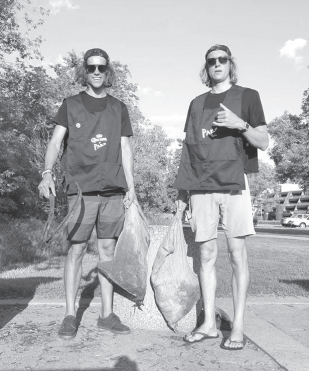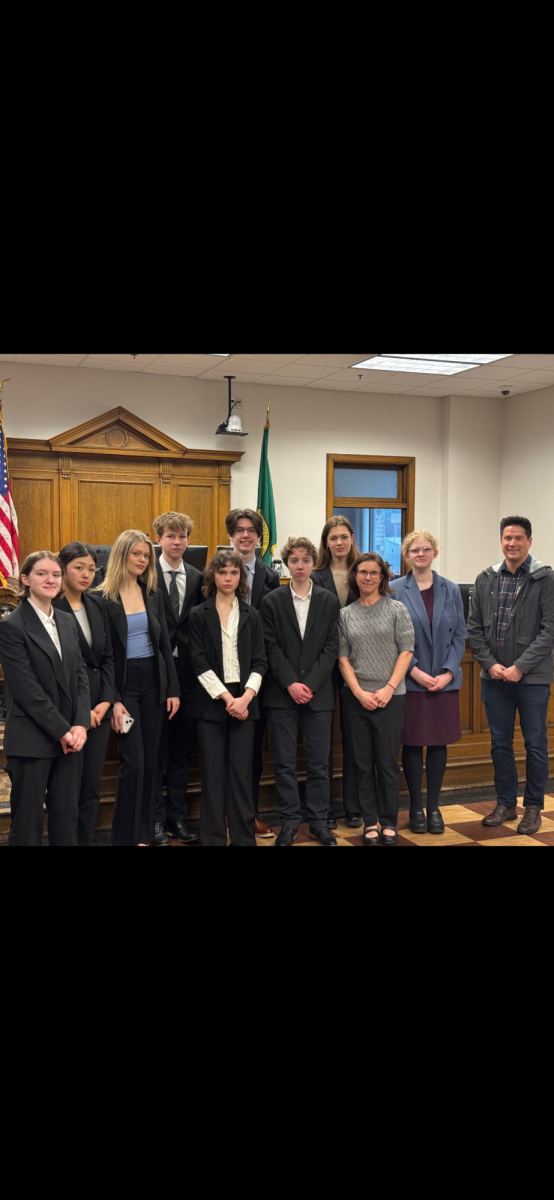Community learns about the effects of single use plastic and how to reduce their intake
Paige Anderson and Tess Petrillo, Sports Editor and News Editor
ORIGINALLY PUBLISHED JANUARY 24, 2019
Partnered with Parley for the Oceans, Nick and Hans Schipper travel the West Coast in their blue school bus teaching students about the dangers of plastic pollution. (Photo courtesy of Nick and Hans Schippers)
Newly partnered with Parley for the Oceans, a company that works with large corporations to eliminate plastic waste, Nick and Hans Schippers came to educate students. Their goal is to educate students about the detrimental effects of plastic in the oceans, something they have been doing for numerous years.
Last year, the brothers took a refurbished blue bus down the West Coast teaching thousands of students along the way about the plastic that pollutes our oceans.
Hans received his undergraduate degree from the University of Hawaii and went on to get a degree in political science and a master’s in environmental public policy from the University of Washington. His younger brother Nick also went to the University of Washington and received a degree in environmental studies and environmental policy.
It’s About Education
Hans’ exposure to the environmentalist action in Hawaii is what inspired the brothers to take their first educational tour.
“The model of the tour was from Hawaii’s teaching of 10,000 students every year about plastic pollution,” Hans said. “Nick and I see that there is a gap in education now and we need to create a directional change, and that starts with empowering our youth. If we can give you guys the tools to begin to build a community, we can begin to solve some of the issues.”
The Problem
The issues Hans is referring to are those caused by plastic pollution. Single-use plastics create a surplus of waste that has nowhere to go, and take about 1,000 years to fully decompose.
When landfills run out of space, waste ends up in our oceans. When plastic ends up in the ocean, sunlight photodegrades it into small pieces. These small pieces can then be mistaken by aquatic life and birds as food. Ingested plastic damages the internal organs of fish which raises the question about the safety of our seafood
The Schippers brothers want to resolve this issue with empowering and educating youth to take action. How did they know that empowering students would resolve the issue? Because it already has.
Hawaii’s dedication to the education of students on plastic pollution has caused the state to have legislative results. “Hawaii recently passed the 4-40 bill that bans single-use plastic, the only reason it was passed is because of a massive turnout of youth activists that showed up to the legislative meetings and made their voices heard,” Hans said. “If we could get something like that to take place all over the country, then we could slow down plastic production.”
The brothers began working with Parley after their education tour. Parley had been working primarily with larger corporations to increase sustainability economically such as partnering with Adidas to create a program where shoes can be given to the store after they had been used to be remade into new shoes.
“We decided to switch roles and work for Parley for the Oceans,” Hans said. “That kind of led us to wrap up our education tour last year and continued onto Canada to work with Parley and began hosting cleanups around the country.”
Their Goal
Hans and Nick want students to be involved in fighting for sustainability and waste elimination as well, not just large corporations. So they began giving education tours for Parley to help in expanding their audience.
In addition to educating about the effects of plastic pollution on the environment, Hans and Nick try to introduce ways of resolving the issue in an economic or societal way, as well as a few personal ones.
The brothers discussed the use of compostable plastic, the kind that makes up our lunchroom utensils, and how it is only beneficial to the environment if they can be processed through the correct facilities.
“Compostable plastics are only taken by facilities that can process the plastics,” Hans explained. “In Hawaii, they are trying to work on making sure that every facility can compost the corn-based plastics. If we get our youth educated about that and get them to show up at their legislative house and ask to invest in those facilities, it could cause a beneficial change.”
Hans and Nick plan to continue their tour this year as well as preparing other educators to go on similar tours in years to come.
Within the next five years, the brothers plan to have educated 500,000 students nationwide.
How to Make an Impact
Solving an issue as big as the estimated 8 million metric tons of plastic trash that ends up in the oceans every year, may seem like an unmanageable task but Parley has designed a simple method that can make an impact.
“We need a material revolution, we need a new material that can replace the single-use plastic.”
The strategy is called AIR and it stands for avoid, intercept and redesign. The first step is to reduce plastic intake and find a replacement for it such as reusable water bottles, shopping at farmers markets, using metal straws, the little things make an impact. Intercept means to retrieve and recycle — locate the single-use plastic and dispose of it properly. The last step is to redesign the material — find new ways to reuse single-use plastic so it’s not as detrimental to the environment.
“The little things really do add up,” Hans said. “If somebody is taking action on this you should support them to keep going or be that person to take action in your community.”

























